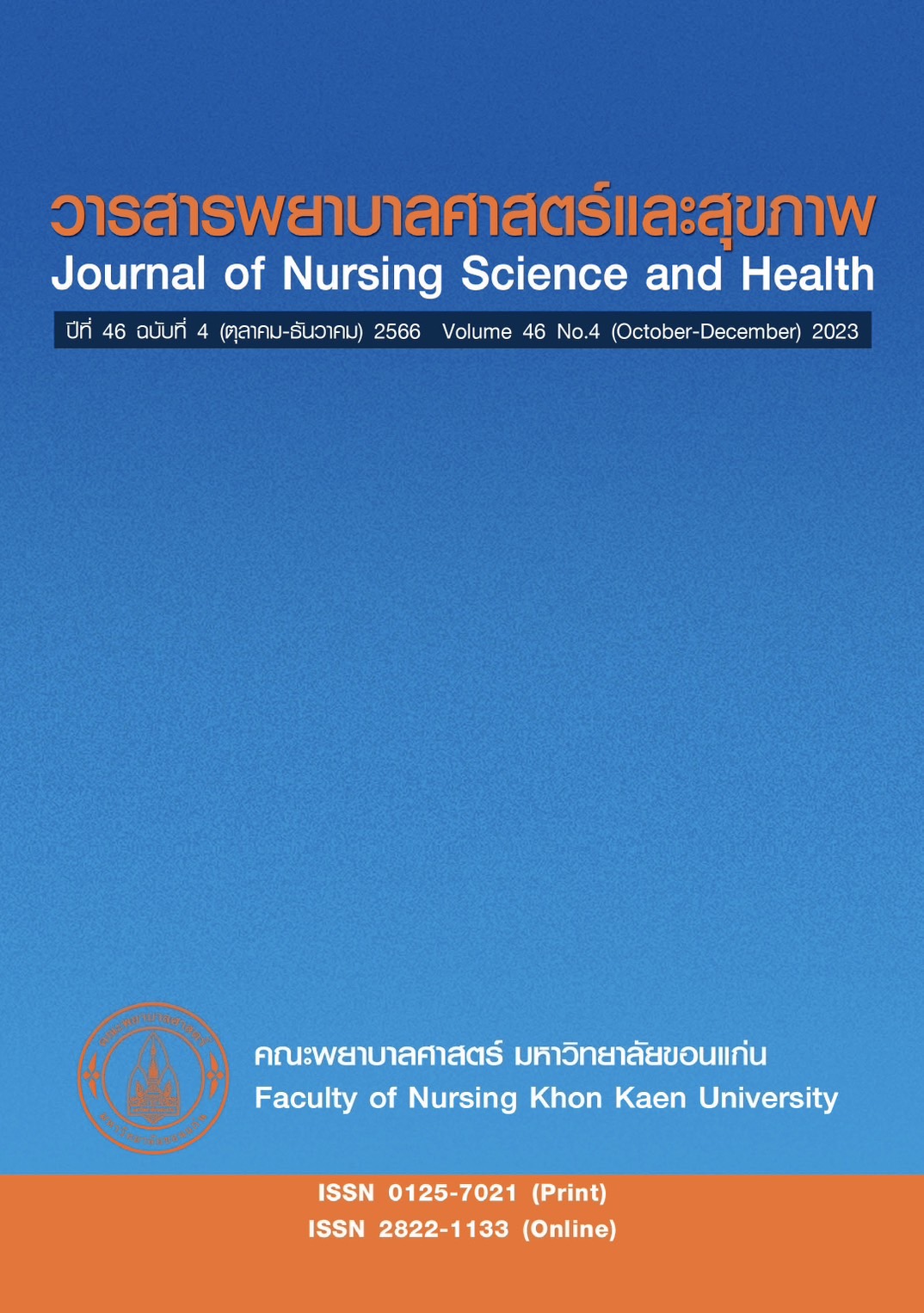บันทึกการเสวนาของท่านนายกสภาการพยาบาล รศ.ดร.สุจิตรา เหลืองอมรเลิศ ประเด็น “ทิศทางคุณภาพมาตรฐานของอาจารย์พยาบาลในวิถีใหม่”
คำสำคัญ:
คุณภาพมาตรฐาน, ทิศทางการศึกษาพยาบาล, วิถีใหม่, อาจารย์พยาบาลบทคัดย่อ
บทความพิเศษรับเชิญนี้นำเสนอภาพรวมโดยสรุปของการเสวนา ณ คณะพยาบาลศาสตร์ มหาวิทยาลัย ขอนแก่น มีประธานสภาการพยาบาล รศ.ดร.สุจิตรา เหลืองอมรเลิศ เป็นผู้นำเสวนาซึ่งมุ่งเน้นไปที่การจัดการกับฉาก ทัศน์ประเทศที่มีการเปลี่ยนแปลงการจัดการศึกษาพยาบาลเพื่อตอบสนองต่อการเปลี่ยนแปลงทางสังคมและกลยุทธ์ การจัดการของประเทศ ซึ่งมีปัจจัยขับเคลื่อนสำคัญต่อการเปลี่ยนแปลง อาทิ ผลกระทบของการแพร่ระบาดของ โควิด-19 การเปลี่ยนแปลงนโยบายเกี่ยวกับกัญชา การปรับเปลี่ยนกฎระเบียบการควบคุมหลักสูตรโดยกระทรวง การอุดมศึกษา วิทยาศาสตร์ การวิจัย และนวัตกรรม (อว.) การถ่ายโอนความรับผิดชอบการดูแลสุขภาพแก่ หน่วยงานปกครองส่วนท้องถิ่น รวมทั้งการขาดแคลนพยาบาลและอาจารย์พยาบาลอย่างต่อเนื่อง
ทั้งนี้ รศ.ดร.สุจิตรา เหลืองอมรเลิศ ได้ย้ำถึงความจำาเป็นของสถาบันการศึกษาพยาบาลที่ต้องปรับตัว และยกระดับแนวทางให้สอดรับกับสถานการณ์ที่เปลี่ยนแปลงไป ดังมีการเสวนาเกี่ยวกับกลยุทธ์ต่อไปนี้ 1) การเตรียมการรับการประเมินคุณภาพและผลลัพธ์การจัดการเรียนการสอน 2) การเผชิญปัญหาการขาดอาจารย์ พยาบาลที่ต้องการเพิ่มจำนวนและคุณสมบัติของอาจารย์ให้เป็นไปตามมาตรฐานสากล 3) การจัดทำโปรแกรม การฝึกอบรมผู้เชี่ยวชาญเฉพาะด้านที่สอดคล้องกับความต้องการของประเทศ 4) การสร้างองค์ความรู้ทาง การพยาบาลผ่านการปฏิบัติการพยาบาล งานวิจัยและนวัตกรรม
การเสวนาดังกล่าวเน้นย้ำถึงความสำคัญของความพยายามร่วมกันระหว่างสถาบันการศึกษาการพยาบาล ทั้งในและนอกประเทศ เพื่อให้มั่นใจว่าอาจารย์ผู้สอนทางการพยาบาลมีความพร้อมในการรับมือกับความซับซ้อน ของยุคใหม่ ผู้เขียนหวังว่าการเผยแพร่บทความนี้จะเป็นประโยชน์แก่ผู้สนใจต่อไป
เอกสารอ้างอิง
Announcement of the commission on higher education standards on details of learning outcomes according to higher education qualifications standards B.E. 2022;139(212d):35,2022-09-9. (in Thai)
Thai nursing problems ‘A shortage - the state mechanism is not conducive to pulling nurses into the system [Internet]. [cited 2023 Aug 29]. Available from: https://www.hfocus.org/content/2016/04/11994# (in Thai)
World Health Organization. Primary health care [Internet]. [cited 2023 Aug 29]. Available from: https://www.who.int/health-topics/primaryhealth-care#tab=tab_1
World Health Organization. Global status report on noncommunication diseases 2010. Geneva: WHO; 2010.
The office of primary health care system support. Quality manual for primary health care service standards 2023. Nonthaburi: Ministry of Public Health; 2022. (in Thai)
Doody O, Doody CM. Conducting a pilot study: Case study of a novice researcher. Br J Nurs 2015;24(21):1074-78.
ดาวน์โหลด
เผยแพร่แล้ว
รูปแบบการอ้างอิง
ฉบับ
ประเภทบทความ
สัญญาอนุญาต
ลิขสิทธิ์ (c) 2023 วารสารพยาบาลศาสตร์และสุขภาพ

อนุญาตภายใต้เงื่อนไข Creative Commons Attribution-NonCommercial-NoDerivatives 4.0 International License.
วารสารพยาบาลศาสตร์และสุขภาพเป็นเจ้าของลิขสิทธิ์ในการเผยแพร่ผลงานที่ตีพิมพ์ห้ามผู้ใดนำบทความที่ได้รับการตีพิมพ์ในวารสารพยาบาลศาสตร์และสุขภาพไปเผยแพร่ในลักษณะต่าง ๆ ดังนี้ การนำบทความไปเผยแพร่ออนไลน์ การถ่ายเอกสารบทความเพื่อกิจกรรมที่ไม่ใช่การเรียนการสอน การส่งบทความไปตีพิมพ์เผยแพร่ที่อื่น ยกเว้นเสียแต่ได้รับอนุญาตจากวารสารพยาบาลศาสตร์และสุขภาพ



